US Expresses Concerns Over Regime Oppression
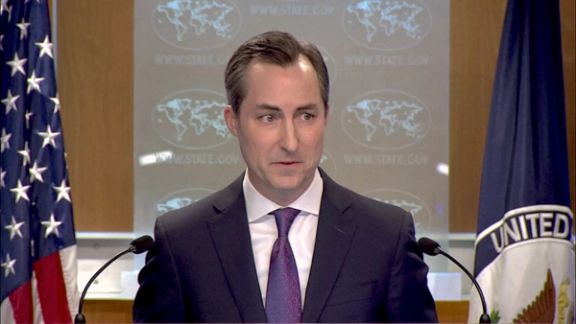
The US Department of State raised concerns about the Iranian regime's ongoing intimidation of the families of slain protesters and journalists.

The US Department of State raised concerns about the Iranian regime's ongoing intimidation of the families of slain protesters and journalists.
He stated, "The world is watching its treatment of these families and the ongoing intimidation of journalists and abuse of peaceful protesters, and we will continue to watch it closely and take whatever steps are appropriate to respond to it."
The comments come in the wake of the recent release of approximately $6 billion in Iranian assets frozen abroad by the US government. This release is part of a larger deal that includes the exchange of five US prisoners held in Iran for five Iranians detained by the United States. However, the move has sparked controversy, with many Iranians condemning it as a “ransom payment”.
Notably, the hostage exchange deal left unresolved three other US cases – Jamshid Sharmahd, Afshin Vatani, and Shahab Dalili.
During a hearing before the Foreign Affairs Committee in Congress on Thursday, concerns were raised that the deal does not effectively deter further hostage-taking and allows the Iranian regime to divert resources meant for humanitarian purposes toward security forces, missile programs, and proxy groups. It also threatens to undermine the international sanctions regime.
However, Miller reiterated that the released funds would only be accessible to Iran for humanitarian purposes, such as acquiring food, medicine, and other necessities that directly benefit the Iranian people rather than the regime.
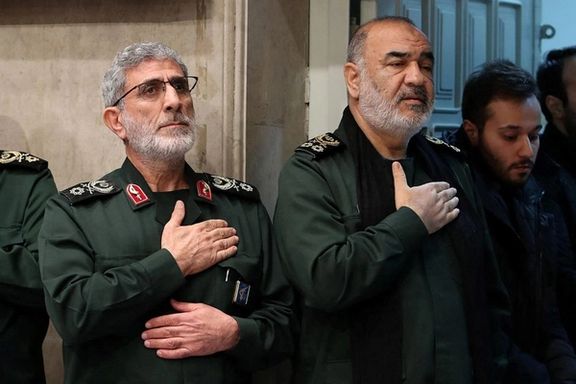
A rare criminal complaint was filed with Paris prosecutors on Thursday, targeting three senior Iranian officials from the regime's security apparatus.
The accusation against IRGC commander Hossein Salami, Intelligence Minister Esmail Khatib, and Quds force commander Esmail Qaani includes "death threats and justifying terrorism."
The six plaintiffs in the case are all exiled Iranians who have been living in France since the 1980s, and include a filmmaker, a journalist, a writer, and an LGBTQ+ rights activist. They have all taken public stances against Tehran, and their complaint, while largely symbolic, coincides with the first anniversary of Mahsa Amini's death last September, which sparked the Woman Life Freedom movement in Iran.
The threats were made in response to support for nationwide protests in Iran following the death of Mahsa Amini in custody of the morality police. One such threat came from Khatib on December 13, where he warned that "anyone playing a role in the riots will be punished, wherever they are in the world."
Additionally, on January 10, Salami himself made a statement regarding "the French people and the managers of [satirical anti-clerical magazine] Charlie Hebdo," suggesting they shouldn't concern themselves with Salman Rushdie's fate. This statement related to the fatwa against Rushdie issued by Iran's late leader Ayatollah Ruhollah Khomeini. The Charlie Hebdo staff had previously been targeted by jihadist gunmen in 2015 for publishing cartoons of the Prophet Mohammed.
Chirinne Ardakani, a French-Iranian lawyer from the Iran Justice Collective, characterized these threats as "disguised fatwas" against Iranian opposition activists worldwide.
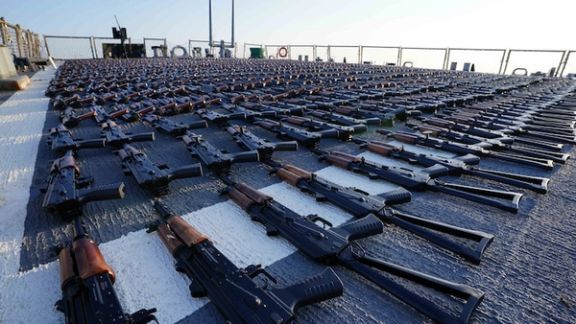
Saudi Arabia invited Yemen's Iran-backed Houthis to Riyadh to continue ceasefire talks, the state news agency SPA reported on Thursday.
The kingdom wanted to resume efforts helped by Oman to "reach a permanent and comprehensive ceasefire in Yemen and a sustainable political solution acceptable to all Yemeni parties," SPA added.
Mohamed Ali al-Houthi, head of the Houthi supreme revolutionary committee, said late Thursday that talks were continuing between Sanaa and the Saudi Arabia with Omani mediation.
The discussions included "paying salaries of the Yemeni employees, opening airports and ports, releasing all prisoners and detainees, the exit of foreign forces, and reconstruction leading to a comprehensive political solution," he said.
The Houthi al-Masirah TV reported earlier on Thursday that a delegation left Sanaa and was on its way to Riyadh to continue the negotiations.
The trip will be the first official visit by Houthi officials to the kingdom since the war broke out in Yemen in 2014, after the Iran-aligned group ousted a Saudi-backed government in Sanaa.
The peace initiatives have gained momentum since arch-rivals Saudi Arabia and Iran agreed to re-establish ties in a deal brokered by China. A permanent ceasefire in Yemen would mark a milestone in stabilizing the Middle East.
The first round of the Oman-mediated consultations between Riyadh and Sanaa, which are running in parallel to UN peace efforts, was held in April when Saudi envoys visited Sanaa.
The group has been fighting against a Saudi-led military alliance since 2015 in a conflict that has killed hundreds of thousands and left 80% of Yemen's population dependent on humanitarian aid.
Reporting by Reuters

Britain, France and Germany will retain ballistic missile and nuclear proliferation-related UN sanctions on Iran, set to expire in October under the 2015 Iran nuclear deal.
Reuters reported in June that European diplomats had told Iran they planned to keep the measures.
"In direct response to Iran’s consistent and severe non-compliance with its JCPoA commitments since 2019, the governments of France, Germany, and the United Kingdom intend to maintain nuclear proliferation-related measures on Iran, as well as arms and missile embargoes, after Joint Comprehensive Plan of Action (JCPoA) Transition Day on 18 October 2023," a spokesperson for the three countries, known as the E3, said in a statement.
European sources had cited three reasons for keeping the sanctions: Russia's use of Iranian drones against Ukraine; the possibility Iran might transfer ballistic missiles to Russia; and depriving Iran of the nuclear deal's benefits given Tehran has violated the accord, albeit only after the United States did so first.
The US withdrew from the accord in May 2018, demanding a tighter nuclear deal and a change in Iran’s regional behavior and ballistic missile program.
Once the US imposed tough sanctions on Iran’s oil exports, Tehran began breaching JCPOA limits on its uranium enrichment. It intensified the violation in early 2021, after the Biden administration announced its readiness to negotiate and return to the JCPOA.
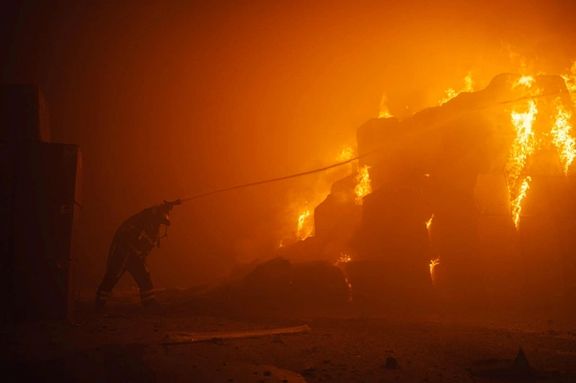
Iran rejected the European decision as "illegal and provocative".
"Undoubtedly, Iran will respond appropriately to this .... action which clearly violates the obligations of the EU, France, Germany and Britain under the JCPOA and the Resolution 2231," Iran's foreign ministry said in a statement, referring to the UN resolution that endorsed the 2015 nuclear pact.
The deal's coordinator, EU foreign policy chief Josep Borrell said he had received a letter from the E3 informing him of their decision and transferred it to Iran, China and Russia, the other participants to the deal.
"As Coordinator, I will consult with all JCPoA participants on the way ahead," he said.
Keeping the sanctions would reflect Western efforts to prevent Iran from developing nuclear weapons and the means to deliver them despite the collapse of the 2015 deal.
It also reflects fears of missile proliferation, with Iran already having supplied hundreds of kamikaze drones to Russia that have targeted infrastructure and cities.
The JCPoA agreed with Iran in 2015 envisaged a "Transition Day" eight years later, when remaining ballistic missile and nuclear-related sanctions on Iran would be lifted.
But Britain, France and Germany will now transfer UN sanctions on Iran that are due to be lifted next month into domestic law, while Britain and the EU will retain existing sanctions, Britain's Foreign office said in a statement.
The crux of the JCPOA pact, which Iran made with Britain, China, France, Germany, Russia and the U.S., limited Tehran’s nuclear program making it harder for it to get fissile material for a bomb in return for relief from economic sanctions.
As a result of Trump’s withdrawal from the deal and US President Joe Biden’s failure to revive it, Iran could make the fissile material for one bomb in 12 days or so, according to US estimates, down from a year when the accord was in force.
"Our commitment to finding a diplomatic solution remains. This decision does not amount to imposing additional sanctions nor to triggering the snapback mechanism. We stand ready to reverse our decision, should Iran fully implement its JCPoA commitments," the E3 said, referring to a mechanism that would immediately restore all UN sanctions against Iran.
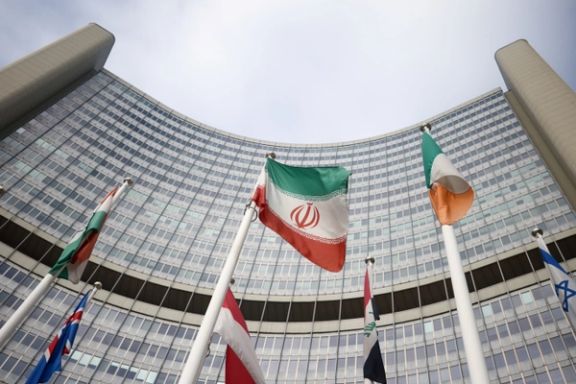
The US and three European allies have warned of another resolution at the UN nuclear watchdog's board in case Iran fails to clarify on uranium traces found at undeclared sites.
Britain, France, Germany -- the so-called E3 -- and the US issued the warning during a quarterly meeting of the International Atomic Energy Agency Board of Governors on Thursday, but they did not specify whether or when they might act on it.
The warning came as the West's standoff with Iran has been complicated by secret US-Iran talks over a prisoner swap agreement and releasing billions of dollars of Iran’s oil revenues frozen in foreign banks due to Washington's sanctions.
A November resolution ordered Tehran to cooperate urgently with the IAEA's investigation into the presence of uranium particles at three undeclared sites, since narrowed down to two.
"If Iran fails to implement the essential and urgent actions contained in the November 2022 Resolution and the 4th March Joint Statement in full, the Board will have to be prepared to take further action in support of the (IAEA) Secretariat to hold Iran accountable in the future, including the possibility of a resolution," the four Western powers said in a statement to the 35-nation IAEA board.
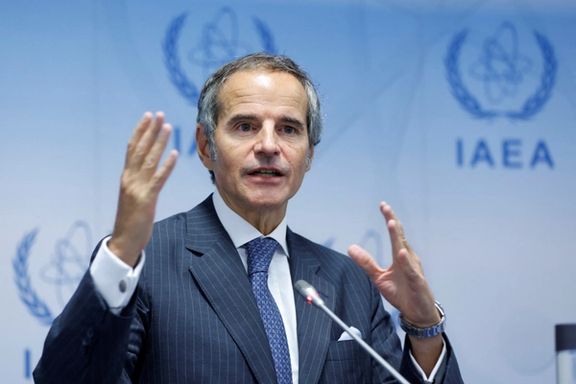
Western powers have recently decried Iran for its lack of cooperation with the IAEA on issues like the re-installation of surveillance cameras removed last year and the enrichment of uranium to levels nearing weapons-grade purity at 60%. However, in parallel, diplomats report that the United States has been engaging in undisclosed "de-escalation" discussions with Iran, potentially complicating matters.
These secretive talks, which Washington has not officially acknowledged, encompass various issues, including Iran's recent reduction in enrichment to 60% purity.
Iran typically reacts to resolutions against it by expanding or accelerating its nuclear activities. Iran maintains that its nuclear program is strictly for peaceful purposes, while Western powers argue that there is no credible civilian explanation for it, particularly uranium enrichment at higher level. The IAEA has never confirmed the peaceful nature of Tehran's nuclear program.
The Thursday joint statement addressed the re-installation of monitoring equipment, such as cameras, but only a fraction of the cameras requested by the IAEA have been installed.
Instead of pursuing another binding resolution against Tehran due to the lack of progress on these issues at this week's IAEA board meeting, Western powers, along with 59 other countries, issued a non-binding joint statement, urging Iran to "act immediately" on various issues, including providing an explanation for the uranium traces.
On the opening day of the IAEA board of governors meeting on September 11, IAEA's Director General Rafael Grossi bemoaned Tehran's failure to respond to IAEA monitoring demands and questions regarding the traces of uranium. He cautioned that his agency is not happy with how relations with Iran progress on the outstanding nuclear issues.
Despite remarks by Grossi, Nasser Kanani, the spokesman for the Iranian Foreign Ministry, said Iran and the IAEA have made “considerable progress” in boosting cooperation based on the March agreement.
“It’s a regret that England, Germany, France and the US, which have certain motivations and positions against Iran, have made Iran-IAEA technical cooperation a subject of their political moves,” he said, adding that the Western states did this in the name of defending the agency and the safeguards, but they aimed to distort the reality of Iran’s sincere cooperation with the agency.
“Of course this measure is not new and also not surprising. In the previous Board of Governors meeting, they had a similar show in the form of verbal attacks and accusations against Iran,” he said.
For years, the IAEA has tried in vain to verify the nature of Iran’s nuclear activities, as the regime obstructs inspections and dodges questions in what many see as a time-buying tactic.
The Biden administration has so far been reluctant to exert more pressure on Iran over its nuclear program and has instead endeavored to buy the regime’s cooperation with a side deal.
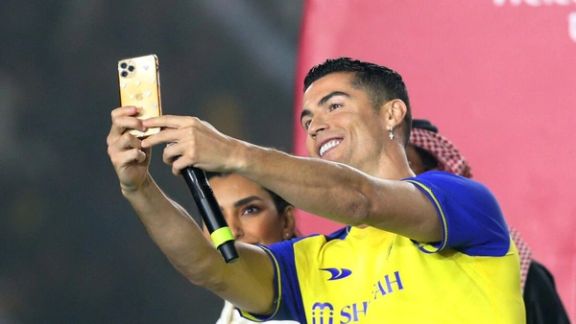
Saudi Arabia has urged Iran to provide unhindered internet access to Cristiano Ronaldo, the renowned footballer playing for Saudi Arabian team Al-Nassr during his stay in Iran.
Access to many international messaging apps and websites are blocked in Iran for both political and religious reasons.
The request comes in response to statements made by Iran's Minister of Tourism and Cultural Heritage, Ezzatollah Zarghami, who emphasized the necessity for Ronaldo to install Iranian domestic messaging apps during his visit to the country.
Zarghami's comments followed remarks made by the CEO of Persepolis Football Club during a live television program, where he discussed providing unfiltered SIM cards to Al-Nassr players traveling to Tehran for a match on September 19.
In the wake of significant reactions within the Persian-speaking online community regarding these statements, the official Saudi Arabian account, communicated in Persian, stating, "For the convenience of international stars and Al-Nassr team members during their time in Tehran, please recommend the best VPN."
The development has sparked discussions online, with some social media users viewing it as a potential source of embarrassment for the Islamic Republic.
During the last twenty years, Iran has implemented stringent internet censorship policies, curbing citizens' access to unrestricted information. This includes the blocking X, Facebook, Instagram and reputable news sources. Nevertheless, these constraints have been bypassed extensively through the widespread adoption of Virtual Private Networks (VPNs) and anti-filtering software.






